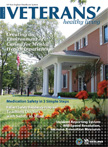Veterans' Healthy Living, Spring 2014
Medication Safety in 3 Simple Steps
Over-the-counter (OTC) and prescription medications are an important part of your health, especially if you rely on them for chronic conditions such as diabetes. When you are hospitalized, VA processes ensure that staff members administer the right medication at the right time in the right quantity. But what about medication safety at home?
1. Your healthcare team needs to know your medication history. With VA's digital recordkeeping,
healthcare providers can easily view your records to see what prescription drugs you take. But you must also tell them what OTC medications you use, including vitamins, minerals, and pain relievers.
Acetaminophen, for example, which is the main ingredient in Tylenol products, is found in more than 600 different over-the-counter and prescription medicines. So you may be consuming acetaminophen in an OTC product and getting it through a prescription drug. To avoid this scenario, tell your healthcare provider and pharmacist about all OTC products you use.
 2. Whether you take prescription drugs daily or only occasionally for an illness or injury, it is important that you understand what you are taking, how to store it and take it, and why it was prescribed. Read any printed instructions that accompany your medication, and don't hesitate to ask your pharmacist questions.
2. Whether you take prescription drugs daily or only occasionally for an illness or injury, it is important that you understand what you are taking, how to store it and take it, and why it was prescribed. Read any printed instructions that accompany your medication, and don't hesitate to ask your pharmacist questions.
Store all medications — even OTC cough and cold products—in a safe place, preferably in a locked cabinet, and keep track of how much medicine is left. Children and adults commonly abuse OTC and prescription medications.
3. Dispose of unused or expired medications properly. Never flush them down the toilet or drain, as they can harm fish, wildlife, and public drinking supply waters. Instead, ask your VA pharmacist how to dispose of them safely. Many communities now offer a drug take-back program. If not, follow these simple steps to dispose of unwanted drugs.
- Keep prescriptions in the original container, which can help identify the contents if accidentally ingested.
- Mark out your name and prescription number on the label.
- Add water or soda to pills to start dissolving them. Mix pills or liquid drugs with something you cannot eat, like cat litter or dirt.
- Close the lid and secure with duct or packing tape.
- Place the bottle inside a non-see-through container like a coffee can, and tape that container closed.
- Dispose of the container in the trash—not in a recycle bin.
VA's Pharmacy Benefits Management Service also recommends the following:
- DO keep medications in the original container, out of sight and reach of children and pets.
- DO dispose of medication that has passed the expiration date.DO store medications that need to be refrigerated where children cannot easily reach them.
- DON'T give your medications to others or take someone else's medications.
- DON'T put different medications into one bottle.
- DON'T take a medication that looks different (i.e., color, shape, size) than you are accustomed to without first checking with your pharmacist.

















